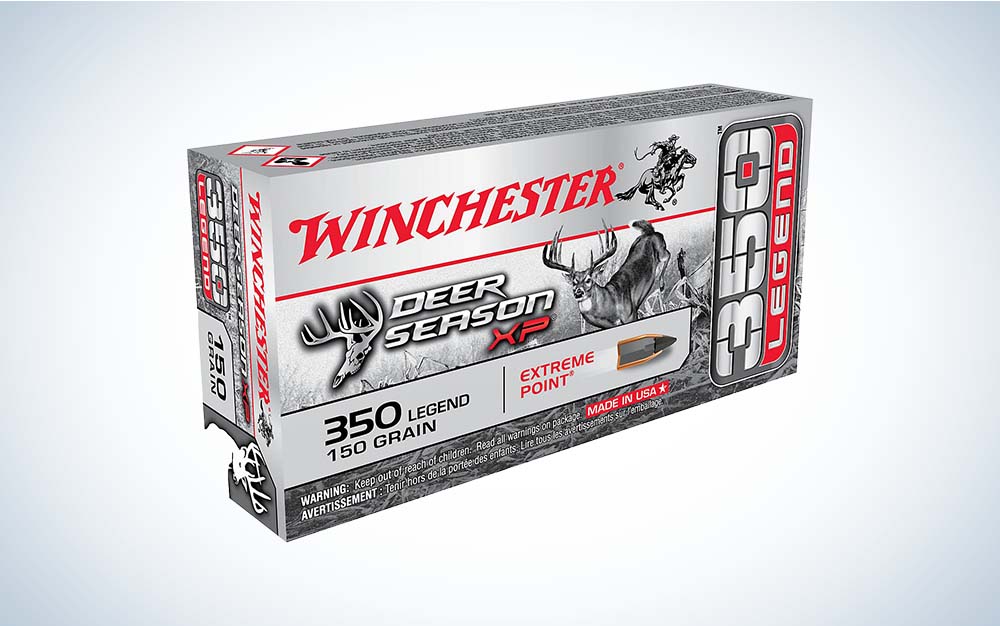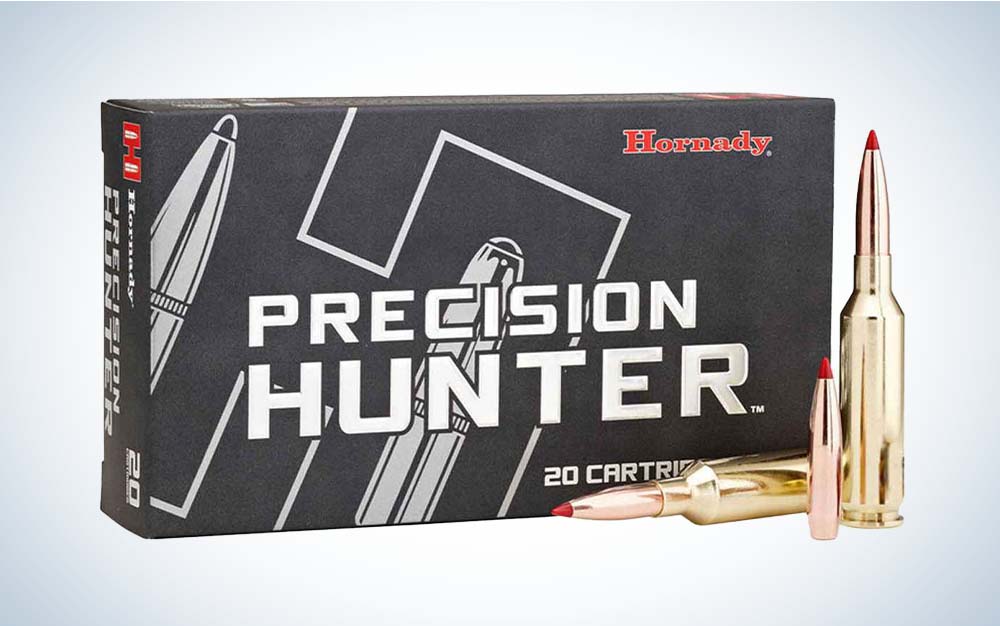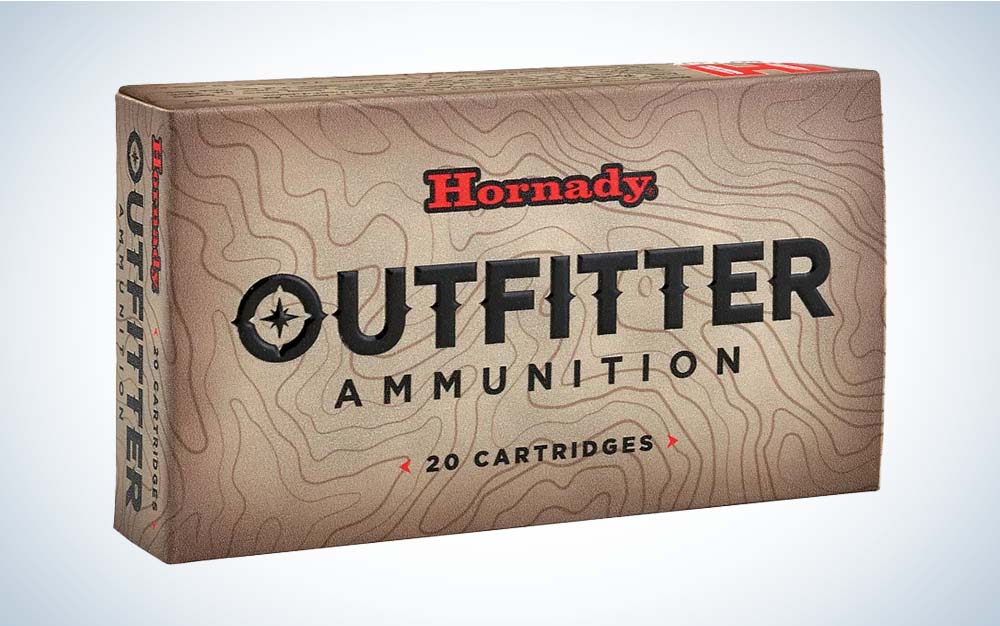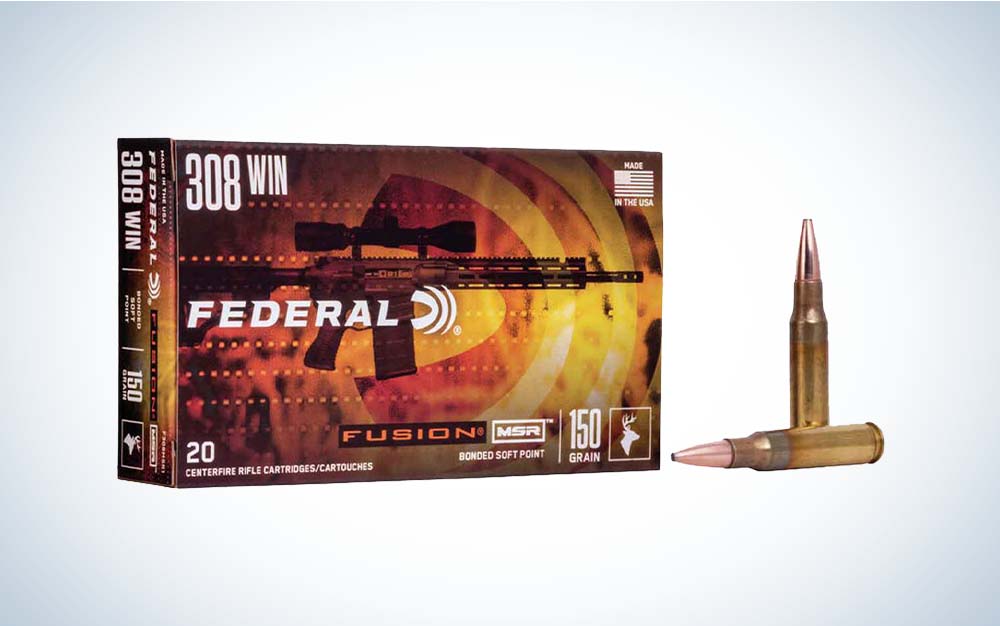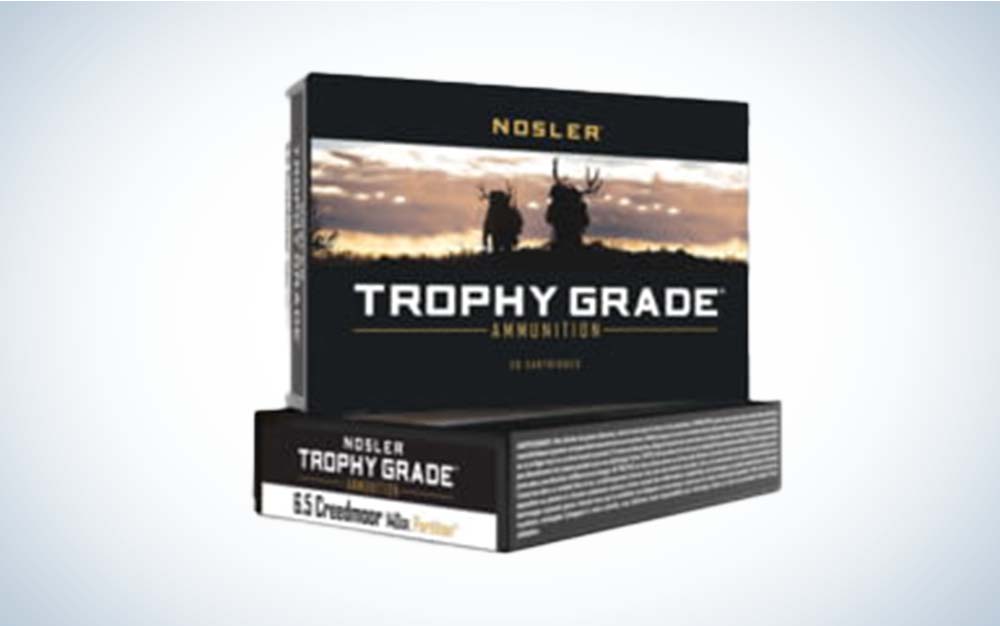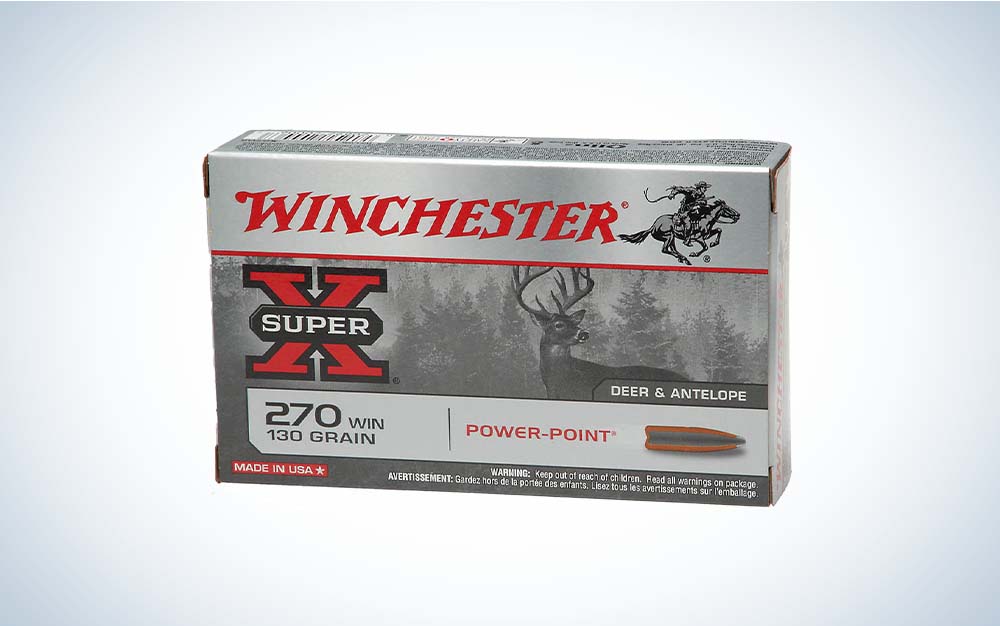We may earn revenue from the products available on this page and participate in affiliate programs. Learn More ›
Updated Jul 26, 2023 4:02 PM
I’ve been hunting hogs for 40-something years and have killed them with just about every caliber for hog hunting and every weapon except a spear. I have pursued them from the oak savannah of central California to the mesquite-choked brush of south Texas, shooting more hogs than I can remember. Some dropped to long shots across big canyons while others were killed up close and personal at halitosis range.
You can’t hunt hogs that long without developing some opinions about ammunition choices, and mine are pretty straightforward. I come down solidly on the side of bullets that hit with authority, penetrate deeply, and expand well. I’ve seen enough “dead” hogs suddenly recover from a seemingly fatal hit–even from rounds as powerful as the .30/06 Springfield–so you won’t find any .223 Rem. or similar cartridges on this list, nor will you find slow, suppressed loads like the .300 Blackout. Lots of hogs have been killed with such cartridges, but range is limited with the subsonic rounds, and performance can be marginal on big hogs with lighter bullets for anything other than head or spine shots. Bear in mind that there’s a difference between hunting hogs for the freezer and trying to eradicate as many as possible because they’re ravaging a landscape. My choices reflect the best calibers for hog hunting that address the needs of the average hunter.
How I Chose the Best Hog Hunting Calibers
This list reflects my preferences for specific hunting conditions, but doesn’t rule out others. Don’t be offended if your pet load didn’t make the cut. Hogs are not bulletproof, and the simple truth is that anyone can kill pigs with any respectable deer cartridge–with one properly placed shot per customer, please. And poor bullet placement can quickly result in a rodeo. While some of these choices are tried-and-true picks, some are relative newcomers, and that’s as it should be. If a better round comes along, I will happily draft it onto the team.
READ NEXT: Best Guns for Hog Hunting
Best Calibers for Hog Hunting: Reviews and Recommendations
Key Features
- High B.C.
- AccuChannel groove
- Bonded lead core and copper shank
- Polymer tip
- Muzzle velocity: 2,730 fps
- Energy: 2,896 ft-lb
Why It Made the Cut
This round has more than enough power to get the job done and will perform well at close range and long distances. It does it all.
Pros
- Accurate
- Good expansion
- Deep penetration
- Effective at close and long ranges
- Common rifle chambering
Cons
- Pricey
- Availability
- Recoil can be a bit much for some
Product Description
Federal’s new top-of-the-line Terminal Ascent hunting ammo has become one of my favorites in a hurry. There’s not much to fault in this design, which traces its lineage to Federal’s proven Trophy Bonded Tip, which evolved from Trophy Bonded Bear Claw ammo. The bullet has a solid shank with a thick, solid copper base supporting a lead core that’s bonded to the copper jacket. The solid shank and bonded core help the bullet achieve deep penetration with good weight retention.
Expansion is ensured by the use of jacket skiving and serrations that allow petals to peel back on contact, even with bullets running at modest velocities. That’s not much of a concern with the 175-grain .30/06 Springfield bullet– it’s still traveling at more than 1,900 fps 500 yards downrange. Expansion gets an assist from a hollow cavity in the bullet’s nose, which is tipped with a Slipstream Tip and has a hollow core running most of its length. The point breaks free upon impact, allowing fluid to enter the hollow core, generating pressure and expansion. Terminal Ascent’s terminal ballistics are, in a word, impressive. A big boar can be tough to put down but won’t stand much chance against this round.
Key Features
- Muzzle velocity: 2,325 fps
- Energy: 1,800 ft-lb
- Extreme Point polymer tip
Why It Made the Cut
This straight-walled cartridge has greater velocity and better terminal performance than the .300 Blackout with far less recoil than the .450 Bushmaster.
Pros
- Terminal performance
- AR friendly
- Good for straight-walled cartridge states
- Affordable
Cons
Product Description
The .350 Legend was designed by Winchester to be the world’s fastest straight-walled cartridge and function in every type of rifle action, and it quickly gained a following. The numbers tell the story: a 150-grain Deer Season XP load steps out at 2,325 fps with 1,800 ft-lb of energy, which gives it a significant advantage over same-weight .300 Blackout and even .30/30 Win. rounds. It has the muscle to kill hogs reliably out to 200 yards or so. Beyond that, velocity and energy fall off quickly.
Should you doubt its effectiveness, I recently returned from a hunt in Canada where some very large black bears were taken cleanly with the .350 Legend. Although the bullet’s sectional density indicates it shouldn’t be a great penetrator, I’ve found the opposite to be true. The 150-grain Deer Season load was designed specifically for deer, but if you want a little more punch, you can step up to Winchester’s 180-grain Power Point .350 Legend load.
Key Features
- High BC
- Boattail
- Polymer tip
- Muzzle velocity: 2,970 fps
- Energy: 3,226 ft-lb
Why It Made the Cut
The 6.8 Western is what the .270 Win. Short Mag. should have been. This load has very good accuracy and a bonded core for deep penetration but is designed to expand at extended range without sacrificing close-range performance.
Pros
- Accuracy
- Controlled expansion
- Deep penetration
- Optimized for long range
Cons
- Pricey
- Availability
- Limited rifle choices
Product Description
The 6.8 Western employs .277 caliber bullets that are longer, heavier, and have higher ballistic coefficients than bullets commonly used for the .270 Win. and .270 WSM. Due to the scarcity of heavyweight .277 bullets, Winchester worked with Sierra and Nosler to create new bullets for the cartridge, and this has resulted in several new factory loads that elevate .277 caliber bullet performance to levels that, in some ways, equal or beat the downrange performance of some 7mm and .30 caliber magnum cartridges. Unlike some target cartridges that were later adapted for hunting, Winchester set out to make the 6.8 Western a great long-range hunting round from the start.
Terminal performance on game has been impressive. The 165-grain Accubond load, in particular, expands well and achieves good penetration. The cartridge has the added advantage of fitting in short actions without sacrificing accuracy. As of this writing, Winchester and Browning are the primary ammo makers, and most rifles chambered in 6.8 Western wear the same brand names.
Key Features
- High BC
- Boattail
- Heat Shield tip
- Muzzle velocity: 2,700 fps
- Energy: 2,315 ft-lb
Why It Made the Cut
Whether you love or hate the 6.5 Creed, Hornady’s 143-grain ELD-X load raised the bar for all ammo makers in delivering match-grade, long-range accuracy with good terminal performance and mild recoil. It also works in AR-10 platforms.
Pros
- Accurate
- Proven performance
- Availability
- Mild recoil
- Common rifle chambering
Cons
Product Description
Unless you’ve spent the last decade locked up in a gun-free Gulag, you likely have a passing familiarity with Hornady’s 6.5 Creedmoor 143-grain ELD-X load. This round, more than any other, has been responsible for the meteoric rise in the popularity of the 6.5 Creedmoor, and with good reason. It is simply a great hunting cartridge.
It is inherently accurate, as are the best rifles that shoot it, and it’s a proven performer on deer-sized game, which happily includes hogs. I’ve shot a number of pigs with this cartridge, and I don’t recall any of them taking more than a few steps after being hit. Thanks to its mild recoil, it’s also a cartridge that most anyone can shoot well. Haters gonna hate, of course, but many detractors are the same people who have been predicting the 6.5 Creed’s demise for more than a decade. They’re going to have a long wait. The 6.5 Creedmoor has become a global standard, and it isn’t going away.
Key Features
- Copper alloy eXpanding (CX) bullet
- Heat Shield tip
- Muzzle Velocity: 2,975 fps
- Energy: 2,555 ft-lb
Why It Made the Cut
Some rifles favor copper bullets and some despise them, but you’ll likely find most rifles to be more tolerant of Hornady’s new CX bullet design.
Pros
- Accuracy
- Deep penetration
- Controlled expansion
- California-compliant
Cons
Product Description
When copper rifle ammo first became mandatory in California, you couldn’t swing a dead piglet without hitting a hog guide who would complain at length about copper bullets “penciling through” hogs that kept running off. While I never had that problem, there is some truth in those complaints, notably with early copper ammo and hunters who insisted on taking heart/lung shots with the stuff.
Proper bullet placement on hogs with a monolithic bullet is through the shoulders. A hog pinned through both shoulders with a reasonably sized copper bullet isn’t going anywhere. A newcomer in this category worth considering is Hornady’s new CX bullet (loaded primarily and initially in the Outfitter line), which improves upon the company’s GMX bullet. In addition to the Heat Shield tip, which helps the bullet maintain a high BC throughout its flight, the design employs specially designed grooves in the bullet that maximize aerodynamic performance while reducing bearing surface and fouling. In 6.5 PRC, Hornady’s 130-grain CX load offers a significant velocity advantage over its 6.5 Creedmoor sibling.
Key Features
- Skived nose
- Muzzle velocity: 2,770 fps
- Energy: 2,555 ft-lb
Why It Made the Cut
It’s hard to go wrong with a .308 Win. on pigs, especially when you’re holding an AR-10 rifle and have multiple hogs in front of you. Federal’s Fusion MSR (Modern Sporting Rifle) round delivers good accuracy at a reasonable price with reliable feeding in AR platforms.
Pros
- Accurate
- Affordable
- Common rifle chambering
- Availability
Cons
Product Description
With a host of newer cartridges competing for hunters’ attention, it’s easy to forget about the old plain-Jane .308 Win., and that would be a mistake. The “baby ought-six,” is one of the finest cartridges ever employed to dispatch hogs. I’ve killed my share with rifles chambered in .308 Win., and so have legions of other dedicated hog hunters.
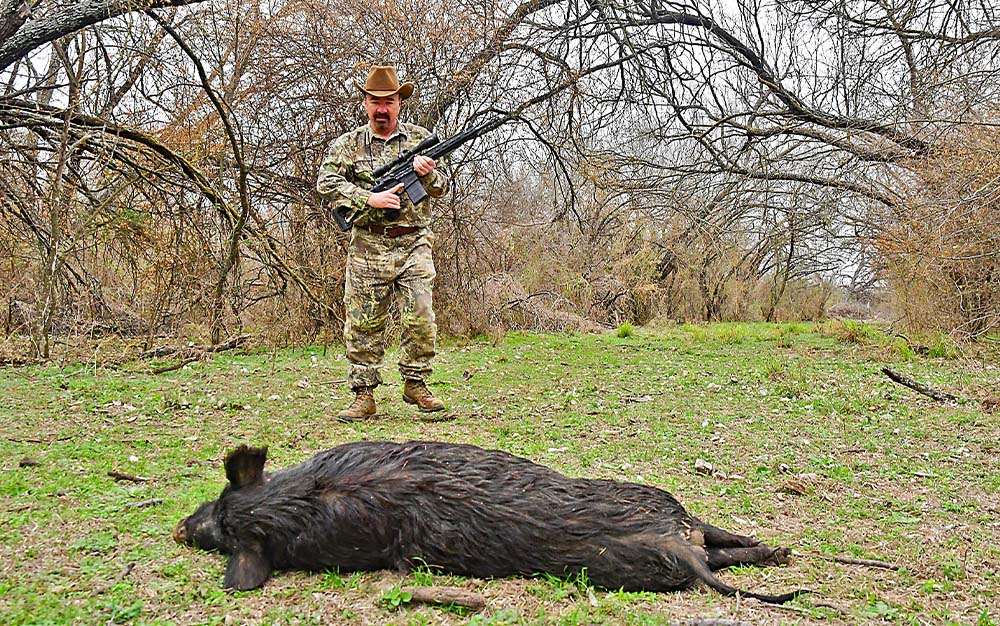
The .308 Win. has long had a reputation for delivering good downrange accuracy, and that’s partly because it fits in stiff, short actions. Ample testimony to the greatness of the .308 is the fact that it has served as the parent cartridge for a host of other cartridges. The .308 is one of the best calibers for hog hunting and has the power to put them down cleanly. Not to mention, you can find rifles chambered in .308 Win. in lever actions, bolt actions, single shots, and semi-autos. Federal’s Fusion MSR 150-grain load is one of my favorites. Designed specifically for use in AR rifles, it typically delivers one-inch, 100-yard accuracy and is more affordable than premium .308 Win. loads. I have yet to see a hog hit with this round do much of anything but drop.
Key Features
- Dual-core bullet design
- Nosler Trophy Grade bullet
- Muzzle velocity: 2,650 fps
- Energy: 2,183 ft-lb
Why It Made the Cut
This round combines the flat trajectory of the 6.5 Creedmoor with a proven stopper of a bullet, the Nosler Partition, which has few equals in putting down game.
Pros
- Proven performance
- Mild recoil
- Common rifle chambering
Cons
Product Description
It can be difficult to determine distance to a target at night, so flat-shooting, hard-hitting bullets are a good choice. Many a hog has been killed with cartridges like the .223 Rem. at night, in the light-and-fast category and with heavier, slower rounds like the .300 Blackout, but I prefer the accuracy and flat trajectory of the 6.5 Creedmoor combined with the proven performance of the Nosler Partition.
I’ve killed quite a few hogs with Partition bullets over the years, and I don’t recall ever having a problem with bullet performance. It may not have the flashy appeal of more modern bullet designs, but it’s a great choice when you absolutely, positively want to anchor critters in their tracks. That definitively beats having to look for wounded hogs in thick brush in the dark.
Read Next: Best Thermal Scopes
Key Features
- Notched jacket
- Muzzle velocity: 3,060 fps
- Energy: 2,702 ft-lb
Why It Made the Cut
A great choice for hunters on a budget, highly affordable Power Point ammo has been getting the job done reliably for more than 60 years.
Pros
- Budget friendly
- Availability
- Common rifle chambering
Cons
- Dated cup-and-core design
Product Description
Winchester’s Super X Power Point ammo has been around for a very long time and shows no sign of going extinct, despite its old cup-and-core design. That’s because everyone can’t afford premium ammo, even if they can find it during the current shortage. Power Point ammo, in common chamberings like .270 Win, remains one of the more available and affordable centerfire rifle loads.
I killed quite a few hogs with the 130-grain .270 Win. load when I first started out and had no desire to buy expensive ammo. The ammo never let me down. I did, from time to time, recover bullets with the jacket and core in separate locations, but even those bullet “failures” resulted in the rapid deaths of lots of hogs. Cup-and-core bullets have been killing game for quite a long time. They’re not suddenly going to stop working just because they’re cheaper than premium cartridges.
Key Features
- Soft point
- Muzzle velocity: 2,820 fps
- Energy: 2,648 ft-lb
Why It Made the Cut
It seems like Power-Shok ammo has been around forever, and with good reason. It delivers solid performance at a reasonable price and, under normal circumstances, can usually be found most anywhere rifle ammo is sold.
Pros
- Budget friendly
- Availability
- Common rifle chambering
Cons
- Dated cup-and-core design
Product Description
This is the second entry on this list in .308 Win., and that’s because the .308 Win. is one of the best cartridges ever employed for hunting hogs. Despite the current ammo shortage, you can usually find Power-Shok ammo with a little effort. Federal’s 150-grain load uses a traditional soft point bullet that’s best-suited for heart/lung shots. The bullet launches at a bit more than 2,800 fps and, when zeroed at 200 yards, strikes just eight inches low at 300 yards.
While the bullet design might be old school, there’s no denying its effectiveness. Power-Shok ammunition offers proven performance, decent accuracy, and consistent velocities at an affordable price.
Key Features
- FTX bullet
- Interlock ring
- Polymer gas-seal base with expanding post
- Muzzle velocity: 1,920 fps
- Energy: 2,374 ft-lb
Why It Made the Cut
In testing, Bore Driver bullets turned in some of the tightest groups I’ve ever shot with a muzzleloader, improving upon earlier designs well known for performance on game.
Pros
- Accurate
- Terminal performance
- Common muzzleloader caliber
- Easy to load
Cons
Product Description
One of the largest hogs I ever shot fell to a .50 Cal. 250-grain muzzleloading bullet, and that hog didn’t take 10 steps after being punched through the boiler room at 40 yards. That bullet was once my favorite for hunting with a muzzleloader, but I have now switched to Hornady’s Bore Driver FTX bullet because it impresses me even more.
It offers the same lethality but considerably better accuracy. This bullet’s unique design does not employ a traditional sabot. Rather, it has a polymer gas-seal base with a post that extends into the bottom of the bullet and expands upon firing to engage the inside of the bullet while short, polymer petals grip the boattail bottom of the bullet as the base engages the rifling. This expanding post causes the bullet to expand slightly, better engaging rifling as it spins down the bore. The result: bullets are better stabilized in flight, contributing to better accuracy. The bullet is designed to expand at muzzleloader velocities with a Flex Tip and a jacket that’s thinner at the nose than at the base. The Flex Tip reliably initiates expansion, even at relatively low velocities, while making the bullet more aerodynamic. Deep penetration is the rule because it has an interlock ring that locks the jacket to the core.
How to Choose a Hog Hunting Caliber
Choosing the right caliber for hunting hogs depends entirely on where and how you’re hunting them. If you’re doing spot-and-stalk hunting in open country, where shots might be long, you’ll want a hog hunting rifle and caliber with a flat trajectory and enough punch (such as 6.5 PRC, .270 Win., .308 Win. and .30/06 Springfield) to do the job when the bullet gets there. If you’re hunting hogs behind dogs or from a stand where shots are typically within 100 yards, you don’t want a light bullet that can blow up on a shoulder and fail to penetrate. Tougher bullets moving at moderate velocities are best for these situations. Your tolerance for recoil is also an important factor to consider. The .30/06 Springfield is often at the upper limit of recoil for many shooters. Shooting something less punishing, like the 6.5 Creedmoor or .350 Legend, may help you put more pork in the freezer because most people shoot less-punishing cartridges more accurately.
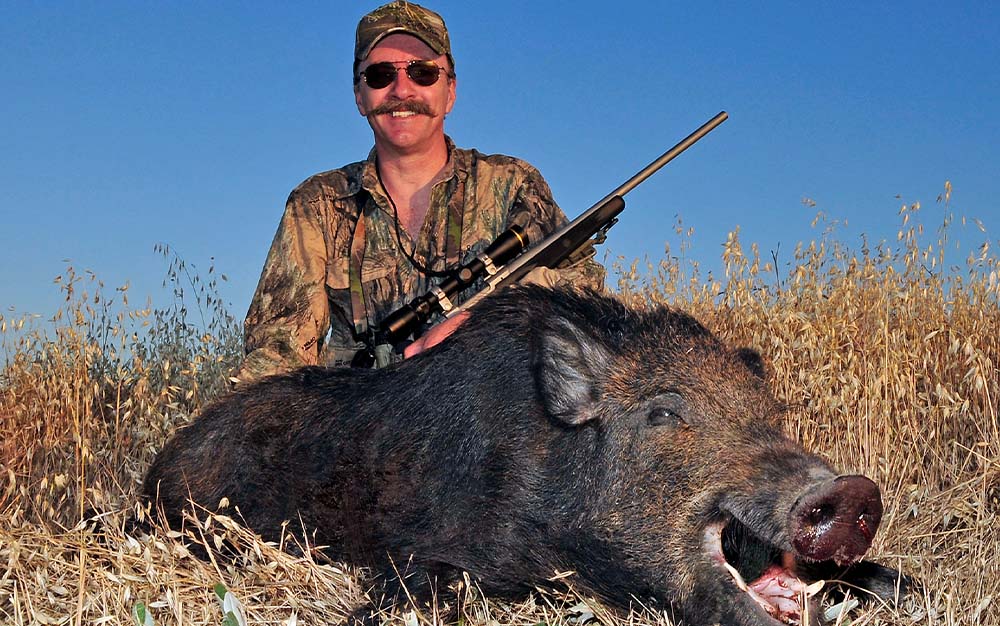
FAQs
Q: Will a 9mm take down a hog?
Yes, a 9mm will take down a hog if you’re holding four aces and have an angel in your pocket. I know one individual who killed a charging grizzly with a 9mm, but just because you can do something doesn’t mean you should. Ethical hunters have an obligation to use enough gun to achieve quick, humane kills, and 9mm is a poor choice for the job. A friend once emptied a .45 ACP magazine into a hog without putting it down. I once followed up a wounded hog and shot it between the eyes with a .44 Mag. The round bounced off the skull, and I had to put another one behind the ear as it ran past me. If these cartridges didn’t get the job done, the odds with a 9mm are not in your favor.
Q: Is a .308 Win. good for hog hunting?
Absolutely, the .308 is excellent for hog hunting. Loaded with proper hunting bullets, the .308 is one of the best all-purpose hog-hunting cartridges. On this list, it ranks only slightly behind the .30/06 Springfield.
Q: What is the best gun for hog hunting?
Whatever floats your boat so long as it’s chambered for a decent deer-hunting cartridge. Single shots, lever guns, bolt action rifles, and semi-autos all work for hogs. AR rifles are preferred by those intent on shooting multiple hogs at once, but choice of rifle isn’t nearly as important as caliber selection and proper bullet placement.
Final Thoughts
Any cartridge listed here might be difficult to find during the current ammunition shortage, but I chose many of them because they may be a little easier to find than others. Your mileage may vary. It’s important to keep in mind that big boars have a thick, protective subcutaneous shield, up to two inches thick, protecting their vitals, so shot placement is key. Hit them in the proper spot with the best calibers for hog hunting, using proven bullets, and you’ll bring home the bacon.

